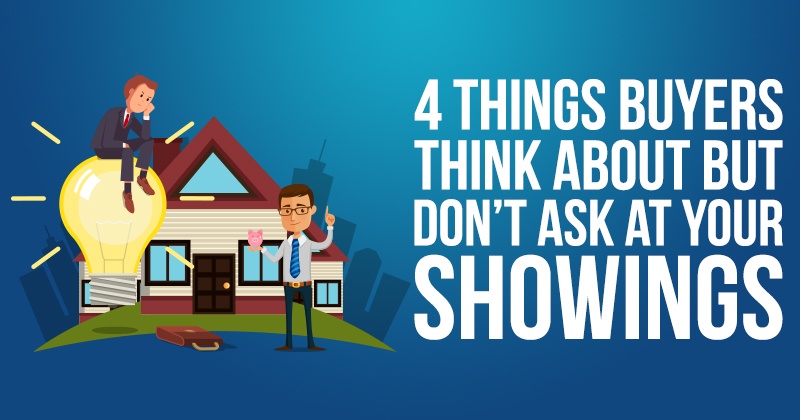No matter how many sales you’ve made or years you’ve worked, you will always worry about what homebuyers think of your listing. You can spend hours, days and weeks prepping for an open house. Sadly, buyers will still have unspoken reservations about purchasing a home.
It’s impossible to read your buyers’ minds, but there are common concerns clients rarely bring up at a listing. Here’s how to handle those concerns.
1. How bad would traffic be to their office?
A married couple wants a new home because they both got new, high-paying jobs. They haven’t spent much time at their new office downtown and are worried about the commute home. They also want kids, and more hours in traffic means less time to spend with their families.
This couple doesn’t think about the traffic question until after they’ve left the listing. At your listing, they’re imagining playing with their kids, not the commute to work. This couple might get home and decide your listing is too far, and they’ll look for a home closer to downtown.
Be informed on how long it takes to get from this home to other areas of town. Mention that information when you are giving tours, along with times of day traffic is better or worse. Do this, and you’ll alleviate one of the biggest homebuyer concerns.
2. Will they be able to land a profit if they sell the house in five years?
Homebuyers feel bad for even asking it: how much money could they make if they sold this home? It’s true that Realtors love matching people with their perfect home. It’s also true some buyers just look at your house as a temporary investment. These buyers want a place to live for a few years that will net them large profits later on.
To land these buyers, you need to be informed about your neighborhood. You need to know the makeup of the neighbors, how property values are increasing, and what is opening nearby. These types of buyers are shy to reveal their intentions. But your knowledge about the neighborhood will make them more comfortable.
If your listing is in a neighborhood that is becoming increasingly popular, make sure to mention that. Know how much the home might be worth in three, five or 10 years. That way, you’ll put your buyers’ minds at ease.
3. Are the surrounding neighbors noisy or quiet?
Everyone has a roommate horror story. If you listen to enough of them, you’ll see that the “bad” roommates often fall into one of two categories: They were overly loud and partied, or they were too quiet and isolated.
These types of “bad” roommates are the same types of “bad” neighbors. A person’s idea of a “bad” neighbor will be an unspoken factor in their owning a home. A quiet, older couple won’t want to live in a neighborhood where people have parties every weekend. Conversely, a family composed of big sports fans will be afraid of complaints from quiet neighbors.
A homebuyer probably isn’t going to reveal whether they’re the loud or quiet type. Knowing what type of neighbors compose the surrounding area will help you and your homebuyers immensely.
4. What public transportation options are available now and will be in the future?
A family of four is looking for a new home. The parents want their children to be environmentally-conscious and are just tired of driving everywhere. Wherever they live, they want public transportation to be readily available.
They will look online to see how long it takes to get to your home by subway. That’s before they even come to the listing. They’ll see it takes two hours to get there by subway and lose interest in your listing. Still, they’ll decide to drive anyway to check if the home might be a good fit.
They’ll turn down your home, go onto Zillow and cross-reference listings with public transportation routes. They'll overpay by tens of thousands for a home located two blocks away from a subway line. They won’t know a new subway line is being built near your home in a year.
People who regularly use public transportation are independent, motivated and self-sufficient. They won’t bother to ask a question about public transportation because they feel they already have the answer. Make clients aware of public transportation developments, both in person and on your listing.
These are all helpful tips to handling buyers’ unspoken questions and concerns. But you still need to focus on getting people there in the first place.
There’s a lot that goes into a good listing. Certain qualities can bring you success, while others could signal failure. Whether you’re a 30-year veteran or someone just starting out, a great listing presentation is essential to reaching your goals.
The “Instant Real Estate Listing Presentation” system and training can give you the upper hand. The system contains:
- Step-by-step training on how to present realistically-priced listings
- Customizing the material learned to your own market
- 100 Long-Lost Sales Strategies to help you close and bring home more money
The entire package is just $97. Visit https://smartagents.co/instant-listing-presentation to purchase yours.
![]() Joe Nickelson is a real estate professional dedicated to helping home buyers and sellers achieve their dreams of owning property, and helping real estate agents stop using the sometimes-vicious tactics that weigh on their consciences. He believes that the Smart Agents books will, quite literally, change people’s lives for the better. Check out his full bio here!
Joe Nickelson is a real estate professional dedicated to helping home buyers and sellers achieve their dreams of owning property, and helping real estate agents stop using the sometimes-vicious tactics that weigh on their consciences. He believes that the Smart Agents books will, quite literally, change people’s lives for the better. Check out his full bio here!






